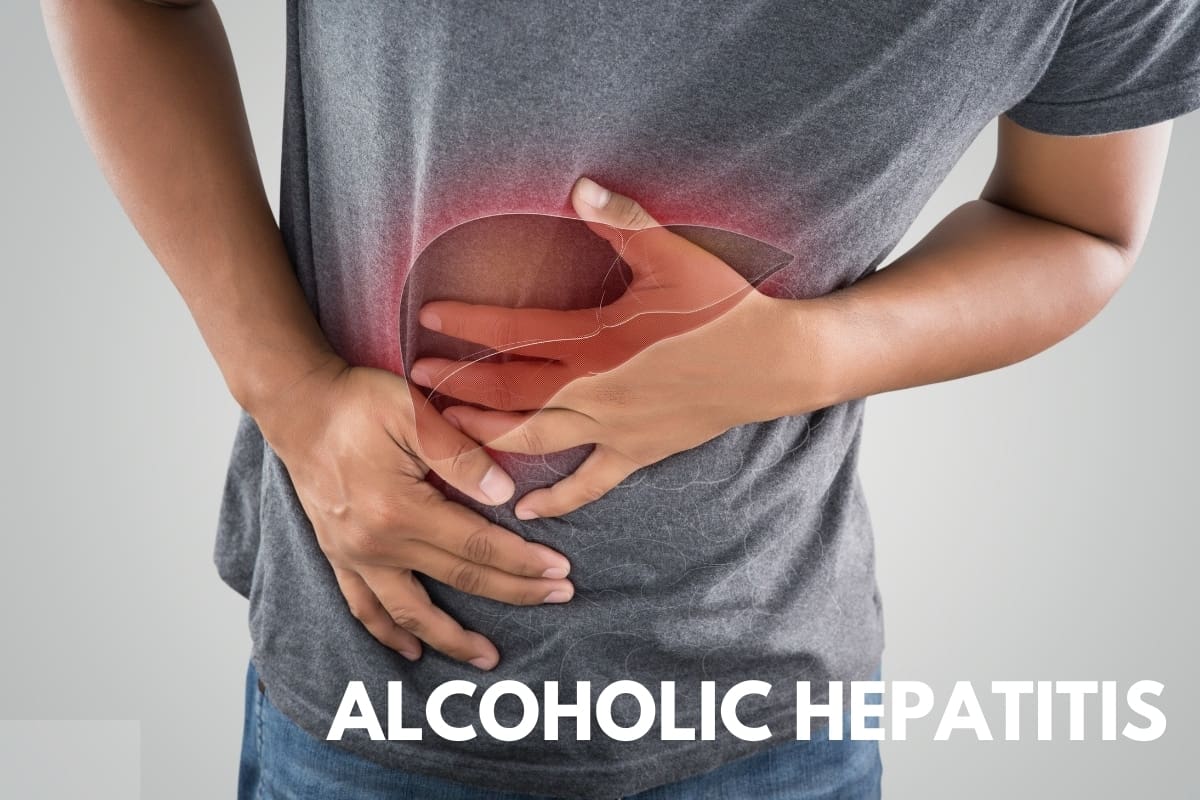Alcohol hepatitis, also known as alcoholic liver disease (ALD), is one of the three types of liver disease caused by drinking. It’s one of the most severe types of alcohol-induced liver damage and caused over 24,000 deaths in 2019. This condition often precedes cirrhosis (irreversible scarring of the liver) which is considered to be the final stage of alcoholic liver disease as well as liver cancer or complete liver failure.
What Is Alcoholic Hepatitis?
Similar to hepatitis A, B, and C, alcoholic hepatitis is severe inflammation of the liver brought about by infection. Unlike those viral types of hepatitis, however, alcohol hepatitis (as its name suggests) is solely caused by exposure to toxins and therefore is not contagious.
But how is it caused exactly? When the liver processes alcohol, the resulting byproducts are highly toxic (and more dangerous than alcohol itself). When the liver is overwhelmed, these damaging byproducts can kill liver cells. This in turn triggers dangerous levels of inflammation which interferes with liver function.
Alcoholic Hepatitis Symptoms
The most common signs of alcoholic hepatitis are directly attributed to impaired liver function. Since the liver’s role works closely with the gastrointestinal system, the symptoms can manifest themselves as side effects related to eating and digestion. These are relatively mild, they include:
- Low-grade fever (caused by the infection)
- Abdominal pain or tenderness
- Nausea and vomiting
- Fatigue or weakness
- Loss of appetite
- Weight loss
- Jaundice (yellowing of the eyes and skin)
Less common side effects can indicate a more severe type of alcoholic hepatitis. These symptoms can be life-threatening and should receive medical attention:
- Ascites (accumulation of fluid in the abdomen)
- Confusion or drastic changes in behavior
- Kidney failure
- Liver failure
Both the direct and indirect consequences of such extensive liver damage are a serious health concern. Fortunately, with early enough detection, this condition can be manageable. If untreated, this chronic condition can be life-threatening.
When Does Alcoholic Hepatitis Happen?
There is no clear cut criteria as to how much someone has to drink to get alcoholic hepatitis, While its general cause is known to be long-term, heavy drinking, not all heavy drinkers will experience this acute type of liver damage. Both binge drinkers and consistently heavy drinkers can find themselves at risk, but those who drink on a daily basis have a higher likelihood. Studies have shown that 60 g of alcohol intake for men, and 20 g greatly contributes to the risk factors.
The exact timeline of when alcoholic hepatitis occurs is unknown, however, the likelihood can be affected by a number of factors such as gender, race, BMI, and quantity and duration of alcohol consumption.
- Women have lower alcohol tolerance than men have twice the risk of developing drinking-related liver issues
- Minorities are more likely to develop severe alcoholic hepatitis due to genetic disposition
- Being overweight can contribute to a fatty liver, a frequent precursor to alcoholic hepatitis
Can Alcoholic Hepatitis be Fatal?
Yes, it is estimated that 1 in 3 with this condition will die from it. Often, it isn’t until the majority of the liver has been critically damaged that there is any outward indication that there is a problem. By the time pain or some other symptom makes itself known, the liver damage is extensive and the organ is likely in critical condition.
Why Your Liver Is So Important
This vital organ is responsible for a number of essential functions from storing vitamins and minerals to the processing of fats, proteins, and carbs. One of which is to detox toxins from the blood. As the body’s primary method of processing alcohol and other drugs, the liver takes the brunt of drinking’s toll on the body, and continued alcohol consumption can cause irreparable damage. The extent of which can range from impaired liver function to all-out failure. The consequences of either can cause a domino effect of other health issues.
It’s Not Too Late To Get Help
The good news is that if acted upon early enough, alcohol hepatitis can be reversed. The liver has an incredible ability to repair itself, in fact, after part of it has been surgically removed the liver can regenerate itself in only a matter of months. However, continued alcohol damage can destroy this capability so it is imperative that those with this condition immediately cease alcohol consumption. Time is of the essence to get your drinking habit under control but quitting cold turkey is never recommended. Alcohol rehab facilities like the Freedom Center can help safely mitigate alcohol withdrawal symptoms and ultimately, help you achieve life-saving abstinence.


































